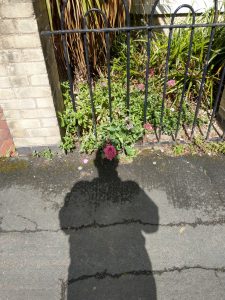
Carl Gustav Jung coined the term “shadow” to draw together the things of ourselves we carry but are not aware of.
That could be read as another way to think of the unconscious, but it fits with Jung’s idea that the path to becoming a more integrated self is to seek to work with the unconscious rather than seeing it as sinister. Dreams, free associations, jokes and “Freudian slips” offer some insight into that world, but Jung’s point is that this is something we carry even when we don’t notice it — like our shadows. Whenever there is light, our bodies cast shadows, even without our awareness. Many people have had the experience of taking a photograph and concentrating so much on what they were photographing that they fail to realise that their own shadow is also in the photo, as if it is so familiar that it is not noticed.
In calling this “shadow” he’s naming the fact that this is often in things we see as bad — though it’s sometimes also there it what we see as almost-excessively positive — in the people and causes we idealise. Inner work is needed to engage with this, so that it doesn’t come to dominate without being noticed. Jung phrased it that “Until you make the unconscious conscious, it will direct your life and you will call it fate.”
Continue reading “Shadow and Theresa May’s downfall”
 Almost since the moment when she became Prime Minister it has been tempting to mock Theresa May. From her 2016 conference speech, when she seemed to have abandoned her previous support for EU membership and managed the meaningless “Brexit means Brexit”, through vacuous comments on the “will of the people”, to her performances as the “Strong and stable” “Maybot” in the 2017 General Election.
Almost since the moment when she became Prime Minister it has been tempting to mock Theresa May. From her 2016 conference speech, when she seemed to have abandoned her previous support for EU membership and managed the meaningless “Brexit means Brexit”, through vacuous comments on the “will of the people”, to her performances as the “Strong and stable” “Maybot” in the 2017 General Election.